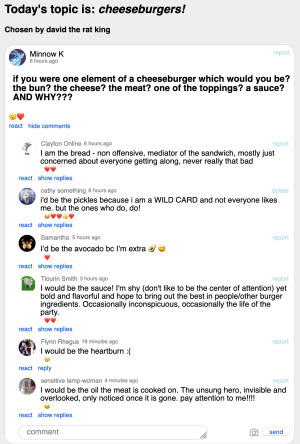In early May, I needed a change of pace from my usual YouTube rabbit holes, having gone down a few of those during months of quarantine. My discovery of Internet Temple almost felt like finding a good bar or music venue; instead of being served content by a video platforms algorithm, I had to know someone, get a tip, and type an entire URL.
The Temple made a blunt entrance on my browsing tab with little more than a cropped YouTube embed and a chat box with no scrolling feature. And then it got weird.
I witnessed a startling musical performance drenched in autotune (the laughs between songs were also autotuned). The singer wore snowman print boxers, an oversized sweater featuring abstract humanoid images, and a hat reading "WWW DOT COM MY ASS." He danced with three stuffed sheep in his hands, while behind him, a green screen was flooded with imagery chosen by audience members. They had selected images of Shrek and Unicode shrimp emojis.
All of this, I would come to learn, was not as silly as it appeared. Rather, Internet Temple's proprietors are invested in decimating the concept of Web 2.0, and theyve started with three separate, intriguing projects.
Weird on the cheap
Performer Clayton Collins and venue creator Toby Alden (they/them) are a fringe breed, making idiosyncratic websites in the spirit of a bygone Internet. Collins, who sometimes goes by "Clayton Online," has a day job maintaining software that manages bus schedules. Alden is a full-time game developer working on an indie video game. The Portland duo's extracurricular creations are essentially alternatives to social media, and they're being made for next to no money.

The first of these, Internet Temple, features a crowded background collage of late-'90s Japanese game sprites. The Temple has hosted live music, DJ sets (some proudly streamed with abysmal quality through Google Hangouts), and poetry readings. The design, with one stage front-and-center, is antithetical to Twitch.
"If you're streaming on Twitch, you're competing with everyone else on there by design," Alden says. They point to the constant nudging by said website to jump to other streams or watch ads, fueled in part by an increasing dependence on the recommendation algorithm.
“They all make you feel bad”
Collins and Alden don't identify with a particular movement, but they're aware that other projects like theirs flourish in the Internet's corners, both by way of small cliques and lone-wolf programmers. Although DIY Internet culture has existed since the days of BBSes, its modern versions stand in contrast to major social media companies accused of selling data, avoiding taxes, and allowing misinformation—most recently by Congress in a July 29 hearing.
"You used to go online and type in the URLs of your favorite sites to see if hardcoregaming101.net had updated," Alden says. "Now it's mostly five or six sites: YouTube, Facebook, Twitter, Insta, Amazon, and so on."
"You don't even need to say, 'And so on,'" Collins interjects. "That's it. Those are them."
"And they all make you feel bad."
The Temple was written in Node.js over the course of three days in 2016. It's recently begun sidestepping YouTube Live (the kind of stream-and-chat system you might expect from a site like this) by borrowing code from Collins' platform Saladbowl, where he hosts and streams videos directly from his computer to bypass copyright strikes. This service is, according to Collins, a fight against the "corporate movement to make art private property." He uses it to broadcast his personal .MP4 video collection to friends, but the bigger goal is a DIY streaming tool for the masses.
“Access to randomness”
YouHole, another site in the same spirit programmed by Alden, exclusively plays YouTube videos under 500 views in random order. You can't click through or see the name of the video (differentiating it from other similar websites), much less save, share, or subscribe. Videos from all over the world come up on YouHole; finding something in English is uncommon.
The site's content-sorting system starts with picking a random language. If that language uses a Latin script, the system selects two random words from a dictionary; if it's any other language, then it uses two random letters or characters from Unicode blocks. Then it trawls YouTube's API, grabbing videos under 500 views and storing them in a server for future use. A lot of videos do come from the same random search term, but they're shuffled within the database for maximum unpredictability.
"YouHole provides access to randomness," Alden says. "You can't do that on any of the major platforms because it's not profitable, so their algorithms conspire to get you into feedback loops of the same content." They maintain that this manipulation makes it easy for platforms to "market to viewers more easily and consistently." YouHole, conversely, defies predictability and allows viewers to experience humanity how it really is, in the abyss.
"I've seen everything on YouHole," Collins says. "I saw a body get exhumed. I saw a lonely older man vlog about cruise ships. It would have been perfect satire had it been made by someone who didn't care about cruise ships as much as this guy." Alden warns newcomers to prepare for the weird, like one disturbing video they saw during a viewing party: "It looked like if you shot up-close footage of a punctured tube of chorizo, but that's not what it was."
These memorable highlights are exceptions, Alden admits. The duo say they can barely remember what passes by on YouHole: "That's a part of it. It's ephemeral."
Today, its cheeseburgers
Although it's only been about five years, Collins is already nostalgic for mid-'10s shitposting groups on Facebook. He cites the infamous DC9, which he joined while seeking an online refuge from family upheaval. His modern ode to this era is a site he developed in JavaScript called Flock, a bare-bones social network with threaded, chronological text posts that better resembles ancient Facebook than it does modern anonymous communities like 4chan.


arstechnica
[contfnewc] [contfnewc]







